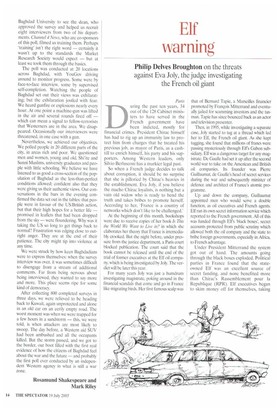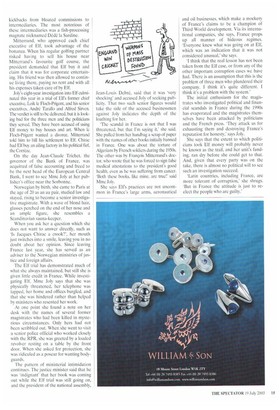Elf warning
Philip Delves Broughton on the threats against Eva Joly, the judge investigating the French oil giant
Paris
During the past ten years. 34 out of the 128 Cabinet ministers to have served in the French government have been indicted, mostly for financial crimes. President Chirac himself has had to rig up an immunity law to protect him from charges that he treated his previous job, as mayor of Paris, as a cashtill to enrich himself, his party and his supporters. Among Western leaders, only Silvio Berlusconi has a murkier legal past.
So when a French judge decides to talk about corruption, it should be no surprise that she is pilloried by Chirac's heavies in the establishment. Eva Joly, if you believe the macho Chirac loyalists, is nothing but a vain old widow who is ready to bend the truth and takes bribes to promote herself. According to her, 'France is a country of networks which don't like to be challenged.'
At the beginning of this month. bookshops were due to receive copies of her book Is This the World We Want to Live in? in which she elaborates her theory that France is irremediably crooked. But the night before, under pressure from the justice department, a Paris court blocked publication. The court said that the book cannot be released until the end of the trial of former executives at the Elf oil company, which is being investigated by Joly. The verdict will be later this year.
For many years Joly was just a humdrum investigating magistrate, poking around in the financial scandals that come and go in France like migrating birds. Her first famous scalp was that of Bernard Tapie, a Marseilles financier promoted by Francois Mitterrand and eventually jailed for scamming investors and the taxman. Tapie has since bounced back as an actor and television presenter.
Then, in 1995, while investigating a separate case. Joly started to tug at a thread which led her to Elf, the French oil giant. As she kept tugging, she found that millions of francs were passing mysteriously through Elf's Gabon subsidiary. Elf was a dangerous target for any magistrate. De Gaulle had set it up after the second world war to take on the American and British oil companies. Its founder was Pierre Guillaumat, de Gaulle's head of secret services during the war and subsequently minister of defence and architect of France's atomic programme.
Up and down the company, Guillaumat appointed men who would serve a double function, as oil executives and French agents. Elf ran its own secret information service which reported to the French government. All of this was funded through Elf's 'black boxes', secret accounts protected from public scrutiny which allowed both the oil company and the state to bribe foreign governments, especially in Africa, to French advantage.
Under President Mitterrand the system got out of hand. The amounts going through the black boxes exploded. Political parties in France found that the stateowned Elf was an excellent source of secret funding, and none benefited more than Chirac's Rassemblement pour la Republique (RPR). Elf executives began to skim money off for themselves, taking kickbacks from bloated commissions to intermediaries. The most notorious of these intermediaries was a fish-processing magnate nicknamed Dede la Sardine, Mitterrand, who approved each chief executive of Elf, took advantage of the bonanza. When his regular golfing partner risked having to sell his house near Mitterrand's favourite golf course, the president demanded that Elf buy it and claim that it was for corporate entertaining. His friend was then allowed to continue living there, paying no rent and with all his expenses taken care of by Elf.
Joly's eight-year investigation into Elf culminated this year in a trial of Eli's former chief executive, Loik le Floch-Prigent, and his senior executives, Andre Tarallo and Alfred Sirven. The verdict is still to be delivered, but it is looking bad for the three men and the politicians they served. They have been accused of using Elf money to buy houses and art. When le Hoch-Prigent wanted a divorce, Mitterrand told him to bill his settlement to Elf. Chirac had Elf buy an ailing factory in his political fief, the Correze.
On the day Jean-Claude Trichet, the governor of the Bank of France, was acquitted of false accounting and freed to be the next head of the European Central Bank, I went to see Mme Joly at her publisher's office near the Sorbonne.
Norwegian by birth, she came to Paris at the age of 20 as an au pair, studied law and stayed, rising to become a senior investigative magistrate. With a wave of blond hair, glasses perched on the end of her nose and an ample figure, she resembles a Scandinavian sauna-keeper.
When you ask her a question which she does not want to answer directly, such as 'Is Jacques Chirac a crook?', her mouth just twitches into a smile, leaving you in no doubt about her opinion. Since leaving France last year, she has served as an adviser to the Norwegian ministries of justice and foreign affairs.
The Elf trial has demonstrated much of what she always maintained, but still she is given little credit in France. While investigating Elf, Mme Joly says that she was physically threatened, her telephone was tapped, her home and offices burgled, and that she was hindered rather than helped by ministers who resented her work.
At one point she found a note on her desk with the names of several former magistrates who had been killed in mysterious circumstances. Only hers had not been scribbled out. When she went to visit a senior police official who worked closely with the RPR, she was greeted by a loaded revolver resting on a table by the front door. When she asked for protection, she was ridiculed as a poseur for wanting bodyguards.
The pattern of ministerial intimidation continues. The justice minister said that he was indignant' that her book was coming out while the Elf trial was still going on, and the president of the national assembly, Jean-Louis Debre, said that it was 'very shocking and accused Joly of seeking publicity. That two such senior figures would take the side of the accused businessmen against Joly indicates the depth of the loathing for her.
'The scandal in France is not that I was threatened, but that I'm saying it,' she said. She pulled from her handbag a scrap of paper with the names of other books initially banned in France. One was about the torture of Algerians by French soldiers during the 1950s. The other was by Francois Mitterrand's doctor, who wrote that he was forced to sign false medical attestations to the president's good health, even as he was suffering from cancer. 'Both these books, like mine, are true!' said Mme Joly.
She says Elfs practices are not uncommon in France's large arms, aeronautical and oil businesses, which make a mockery of France's claims to be a champion of Third World development. Via its international companies, she says, France props up all manner of hideous regimes_ 'Everyone knew what was going on at Elf, which was an indication that it was not considered unusual,' she says.
'I think that the real lesson has not been taken from the Elf case, or from any of the other important corruption cases we have had. There is an assumption that this is the problem of three men who plundered their company. I think its quite different. I think it's a problem with the system.'
The initial enthusiasm for the magistrates who investigated political and financial scandals in France during the 1990s has evaporated and the magistrates themselves have been attacked by politicians and the French press. 'They attack us for exhausting them and destroying France's reputation for honesty,' says Joly.
She says that the extent to which politicians took Elf money will probably never be known as the trail, and her unit's funding, ran dry before she could get to that. And, given that every party was on the take, there is almost no political will to see such an investigation succeed.
'Latin countries, including France, are more tolerant of corruption,' she shrugs. 'But in France the attitude is just to reelect the people who are guilty.'



























































 Previous page
Previous page